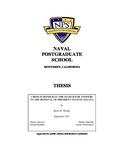"The Berlin Crisis in 1961" : U.S. Intelligence analysis and the presidential decision making process
| dc.contributor.author | Patrick, Mark S | |
| dc.date.accessioned | 2012-08-09T19:24:13Z | |
| dc.date.available | 2012-08-09T19:24:13Z | |
| dc.date.issued | 1997 | |
| dc.identifier.uri | https://hdl.handle.net/10945/9068 | |
| dc.description.abstract | Intelligence analysis played a crucial role in the presidential decision making process throughout the Berlin Crisis. This paper focuses on how intelligence analysis might have aided or misled President Kennedy during the 1961 phase of the crisis, especially during the months of January to July. It also examines presidential leadership of the decision making unit. It considers excerpts of analysis and official correspondence received by the President and sets that advice in the proper historical context by considering its source and the time frame in which it was offered relative to the crisis. It discusses the options as President Kennedy had them presented to him in an effort to recreate the crisis environment in the mind of the reader, and to improve the current presidential crisis decision making process. This paper assumes a building block approach which can be broken down into four major areas of emphasis. First, it focuses on crisis management. It refines the period of time analyzed relative to the Berlin Crisis as a whole, then, Chapters 2 and 3 describe the international crisis management perspective and discuss the crisis background | en_US |
| dc.description.uri | http://archive.org/details/theberlincrisisi109459068 | |
| dc.subject.lcsh | Military intelligence | en_US |
| dc.title | "The Berlin Crisis in 1961" : U.S. Intelligence analysis and the presidential decision making process | en_US |
| dc.type | Thesis | en_US |
| etd.thesisdegree.level | Master of Arts Degree | en_US |
| etd.thesisdegree.level | Masters | en_US |
| etd.thesisdegree.grantor | Flectcher School of Law and Diplomacy Tufts University | en_US |
Files in this item
This item appears in the following Collection(s)
-
1. Thesis and Dissertation Collection, all items
Publicly releasable NPS Theses, Dissertations, MBA Professional Reports, Joint Applied Projects, Systems Engineering Project Reports and other NPS degree-earning written works.





